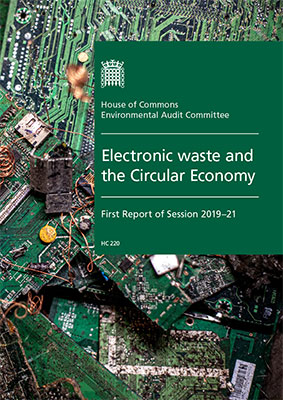The EAC report urges Government to take action on electronic waste through a number of detailed recommendations.
As an ever increasing amount of electronic goods are put onto the UK market, concern grows surrounding the proper disposal and re-use of the rare and valuable materials they contain. This is especially true considering decreasing product lifetimes, lack of repairability and limited reuse options.
The first report of session 2019-2021 ‘Electronic Waste and Circular Economy’ is published today by the Environmental Audit Committee, a House of Commons select committee charged with scrutinising government policy. The report states that the UK is the second highest producer of electronic waste globally, with much of this being improperly collected and treated.
The report especially emphasises the environmental and social consequences of harmful chemical leaching associated with electronic waste, alongside the increasing geo-political concerns and resource scarcity of compositional critical raw materials.
Detailed recommendations to take action
As such, the EAC report urges Government to take action through a number of detailed recommendations, which include:
- The setting of ambitious and long-term targets for collection, reuse and recycling of e-waste and that this action is undertaken to a ‘very high standard’.
- That, ‘as a matter of urgency’, online retailers and marketplaces have the same take-back responsibilities that physical retailers will have in 2021. The document notes the exceptional pressure high streets have experienced this year, and that exempting e-retailers will deepen entrenched competitive disadvantages.
- Furthermore, the report underlines the need for online marketplaces to fully conform to compliance laws, and pay the same producer responsibility fees as other suppliers of electronic goods.
- The report urges Government to ban products manufactured with purposefully short life-times, via planned obsolescence. Moreover, it recommends mandatory labelling that states the expected lifetime and repairability index of all electronic products.
- It calls for assurances from manufacturers that their products can be easily dismantled and subsequently recycled at waste sites. The report recommends this be done through incentivisation, and ‘potentially through an extended producer responsibility system’.
These are just some of the proposals outlined, other sections advise stronger enforcement activity from the Environment Agency in England and a diversion of funds from Energy from Waste plants to higher quality recycling infrastructure.
If adopted and used in conjunction, these measures could produce an electronics market that ‘inspires innovation, improves quality of life and contributes to the prosperity of the UK and sustainable development abroad’.
Legislate to increase product lifetimes
Head of Policy, Robbie Staniforth commented “We welcome many of the findings contained within this excellent report. There is simply too much short-termism in the current system of producer responsibility with little foresight on recycling and reuse ambitions in the UK. However, what this report outlines is that action is needed beyond merely setting ambitious recycling and reuse targets."
"To make good on their promise of a more circular economy in their 2018 Resources and Waste Strategy, the Government need to legislate to increase product lifetimes, specifically relating to software updates and repairability. While it is fashionable to talk about a transition to a circular economy, the basics of the waste hierarchy should not be forgotten."
"Those manufacturers who rethink and redesign products with the environment in mind should be rewarded in a new producer responsibility system. Likewise, the sale of low-cost, short-life products, which are emblematic of just how linear our current economy is, should be discouraged through regulation.”
If you'd like to discuss how this report could impact your organisation, please contact our team.

Louisa Goodfellow
Policy Manager
As Policy advisor Louisa provides key support to our team, including preparing reports on environmental policy issues and maintaining awareness of new developments. As such she will often be found coordinating responses to policy consultations, advocating policy positions and providing internal guidance to current legislation.

Latest News

Q2 2024 recycling data shows strong performance in H1
By Sam Marshall 24 Jul 2024
Ecosurety continue to step up for refill and reuse
By Victoria Baker 24 Jun 2024
Ecosurety renews B Corp™ certification with flying colours
By Louise Shellard 11 Jun 2024
Ecosurety sponsor the 2024 Carbon Literate Organisation Awards
By Louise Shellard 07 Jun 2024

